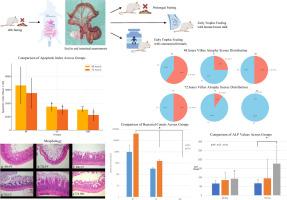在禁食动物模型中,早期引入营养供体人母乳对术后肠道功能保存的影响。
IF 4.9
2区 医学
Q1 BIOCHEMISTRY & MOLECULAR BIOLOGY
引用次数: 0
摘要
饮食限制,如在术后肠梗阻消退前避免口服,可导致负氮平衡、免疫功能减弱和消化系统功能受损。本研究在动物模型中探讨了供体母乳(HM)在早期营养肠内喂养中的功效及其对术后长时间禁食期间肠道功能的影响。雄性Wistar大鼠禁食48小时,免费饮水。在完成回肠横断和肠端到端吻合后,将大鼠分为三组:延长禁食(PF)组、HM早期营养喂养组和商业配方喂养组(CF)。各组进一步分为术后48小时和72小时亚组。该研究测量了各组间肠系膜淋巴结中集落形成单位的数量、血清碱性磷酸酶(ALP)水平和组织病理学数据。术后48、72 h, HM组的平均凋亡指数明显低于PF组(p本文章由计算机程序翻译,如有差异,请以英文原文为准。

Effect of the early introduction of trophic donor human breast milk on the preservation of postoperative gut functions in a fasting animal model
Dietary restrictions, such as avoiding oral intake until postoperative ileus resolves, can result in negative nitrogen balance, weakened immune function, and impaired digestive system performance. This study investigates the efficacy of donor human breast milk (HM) in early trophic enteral feeding and its impact on gut functions during prolonged postoperative fasting in an animal model. Male Wistar rats were deprived of food for 48 hours with free water access. After a complete ileal transection and an end-to-end intestinal anastomosis, the rats were divided into three groups: prolonged fasting (PF), early trophic feeding with HM, and feeding with commercial formula (CF). Each group was further divided into 48- and 72-h postoperative subgroups. The study measured the number of colony-forming units in mesenteric lymph nodes, serum alkaline phosphatase (ALP) levels, and histopathological data between groups. At postoperative 48 and 72 hours, the mean apoptotic index of HM group was significantly lower than in PF group (P<.001). A significant decrease was observed in apoptosis in HM group over time (P=.047), while the CF (P=.327) and PF (P=.959) groups did not show significant changes. HM significantly prevented villus atrophy (P<.01), and bacterial translocation to mesenteric lymph nodes (P<.05) compared to CF and PF. Serum ALP levels, an indicator of intestinal mucosal regeneration, was significantly highest in the HM group at 72 hours compared to other groups (P=.03). These findings suggest that HM not only maintains the structural and functional gut integrity but also promotes earlier and more effective recovery of the intestinal health.
求助全文
通过发布文献求助,成功后即可免费获取论文全文。
去求助
来源期刊

Journal of Nutritional Biochemistry
医学-生化与分子生物学
CiteScore
9.50
自引率
3.60%
发文量
237
审稿时长
68 days
期刊介绍:
Devoted to advancements in nutritional sciences, The Journal of Nutritional Biochemistry presents experimental nutrition research as it relates to: biochemistry, molecular biology, toxicology, or physiology.
Rigorous reviews by an international editorial board of distinguished scientists ensure publication of the most current and key research being conducted in nutrition at the cellular, animal and human level. In addition to its monthly features of critical reviews and research articles, The Journal of Nutritional Biochemistry also periodically publishes emerging issues, experimental methods, and other types of articles.
 求助内容:
求助内容: 应助结果提醒方式:
应助结果提醒方式:


